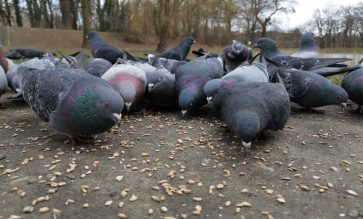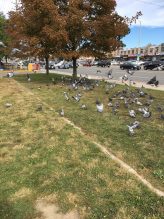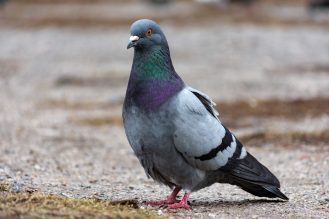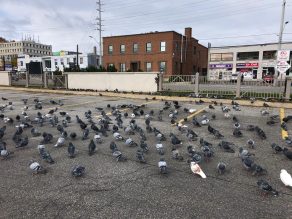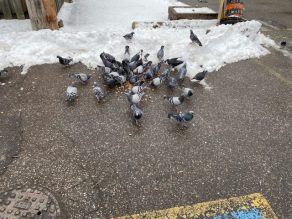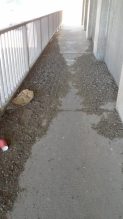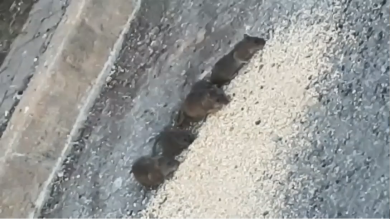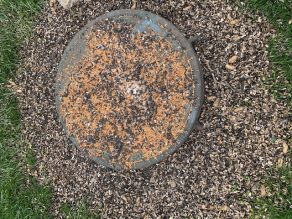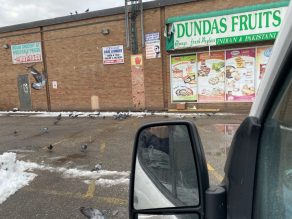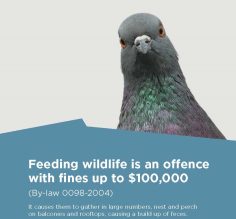Why feeding birds can do more harm than good
City services | January 24, 2024
It’s not uncommon to see people feeding wildlife, especially birds, throughout Mississauga. However, while feeding birds, like pigeons, can seem harmless, it can have negative consequences including serious health and safety concerns for residents and birds.
Feeling the urge to feed the birds? Please don’t. Think twice before you toss that next breadcrumb – here’s why.
Why you should avoid it
Concerns for wildlife feeding in Mississauga relate to leaving food for birds. Feeding birds can cause overpopulation, spread disease and increase competition for food, aggressive behaviour and unsanitary conditions. It can also cause birds to rely on humans for food and damage buildings and structures. Infrastructure, like buildings, parking lots and sidewalks made of metal and stone, can become severely damaged by the corrosive uric acid found in pigeon droppings.
Catch basins or storm drains can be blocked with feathers, nesting materials and bird droppings, resulting in structural damage, flooding and higher water quality risks.
Feeding birds in public places can be a nuisance to other people and businesses.
Pigeons
Pigeons may look cute, but they can be troublesome. These birds are found almost everywhere around the world, including Mississauga. Pigeons are easily recognizable by their distinctive blue, grey and white colouring and iconic bobbing head and cooing sound.
Unlike migratory birds, pigeons stay in one place all year round. They breed and roost in large groups around buildings, causing high noise levels and large amounts of feces, which can be a headache to clean up.
These birds have a strong instinct to nest in urban areas, making it difficult to remove them from populated areas, especially if they have consistent access to food and shelter.
Pigeons tend to rely on humans for their food, particularly seeds, crackers, fruits, grains, bread and garbage.
Health risks
A health risk is also associated with pigeons as they may contaminate food or transmit fungi, bacteria or parasites in their feces. It’s worth noting that Cryptococcosis, Histoplasmosis and Psittacosis are some diseases linked to pigeon droppings. Inhaling the dust created while cleaning the droppings can lead to an infection with these diseases.
Providing food to birds may result in their reliance on humans for food, losing their ability to forage for themselves. Feeding birds with inappropriate food can also pose a significant risk to their health. Some foods lack essential nutrients for survival, leading to malnutrition or even death. It’s crucial to ensure that birds can access a balanced and varied diet that meets their nutritional needs. Providing them with foods that are high in fat, salt or sugar – like chips, fries, crackers and nuts can also cause health problems, such as obesity, liver disease, stroke and heart disease.
Offering wildlife food can often attract other pests, like rats and mice, which in turn, can attract larger predators like coyotes.
Complaints and fines
Feeding wildlife is illegal in Mississauga. This includes actions like leaving food out, not disposing of food waste properly or dumping food on the ground. These actions are considered leaving attractants, and they are enforceable offences under the City’s Animal Care and Control By-law.
Feeding wildlife can encourage them to enter urban areas, increasing their chances of being involved in accidents, potentially leading to property damage, injury or even death.
The City’s Animal Services team works to educate and inform the public about the dangers of feeding wildlife. They enforce regulations prohibiting animal feeding in public areas and work with others in the community, like private business owners, to help promote responsible and safe interactions with our wildlife.
Last year, Animal Services received 284 calls from Mississauga residents about wildlife feeding concerns at several parks, trails and private/public parking lots.
Staff has pursued the installation of “Do not feed signs” and conducted regular patrols in areas where animal feeding has been prevalent.
Wildlife feeding is a city-wide issue. Many patrols have been happening at local plaza parking lots and parks including Rockwood Mall, David Yakichuk Park and Hurontario Street and Dundas Street where many pigeons have been roosting. In total, 657 proactive patrols were completed in 2023 aimed at addressing incidences of feeding.
To ensure the message is taken seriously, Animal Services has been issuing fines to individuals identified feeding wildlife, with several fines being handed out in recent months. The minimum fine amount on each ticket is $365, and fines for further violations can increase up to $100K.
While eight tickets have been issued for wildlife feeding in 2023, with the majority of them being related to feeding birds, despite best efforts, those feeding wildlife often evade our Animal Services officers and leave the scene making it harder to issue tickets.
Pigeon problems?
If you are experiencing issues with pigeons in your neighbourhood, try the following:
- Remove food sources (e.g. bird feeders)
- Clean up and store pet food securely
- Eliminate water sources
- Clear balconies of debris
- Check for signs of nesting
- Remove nesting materials
- Alert building management
- Seal elevated openings and entrances with bird netting to take away access to ledges and balconies
- Use flashing lights and motion-activated noise deterrents
- Place deterrents like plastic owls, hawks or raccoons in the eaves
- Apply gel to ledges to make surfaces unpleasant for birds’ feet
- Secure garbage in sealed containers or bins
- Mix cinnamon, peppermint essential oil or cayenne pepper into a spray bottle of water to deter pigeons
Next time you want to feed the birds, think twice and remember that observing wildlife from a distance and allowing them to fend for themselves supports the well-being of both animals and our community.
For more information about urban wildlife in Mississauga, visit mississauga.ca/wildlife.
Tags
Media contact
City of Mississauga Media Relations
media@mississauga.ca
905-615-3200, ext. 5232
TTY: 905-896-5151
